Published Dec 15, 2022
Harry Kim is a Milestone in East Asian Screen Representation
Give Garrett Wang his roses for holding it down for the rest of us.
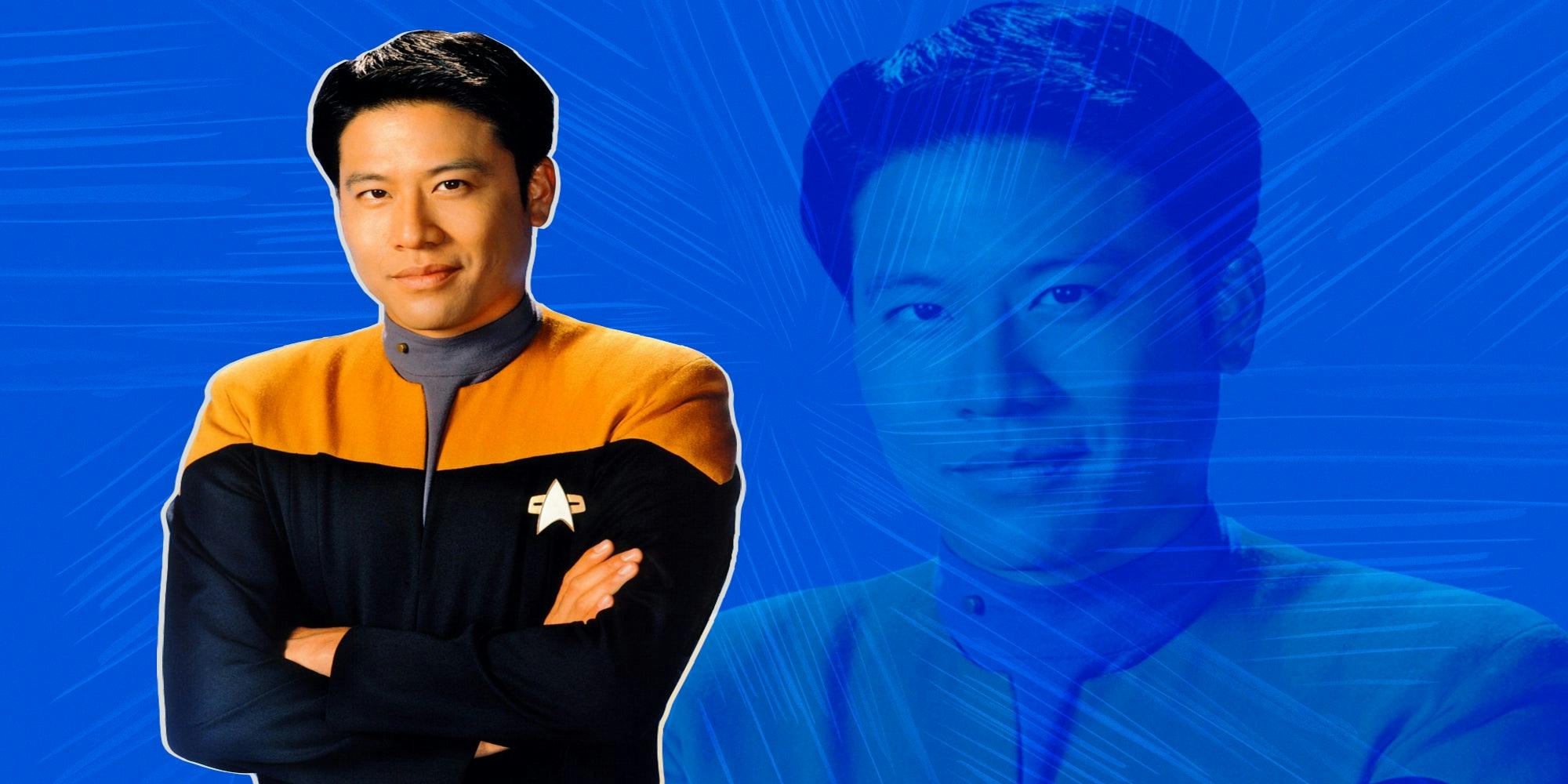
StarTrek.com
Captain Kirk romanced all the attractive female guest stars in Star Trek: The Original Series. Riker did likewise in Star Trek: The Next Generation. And on Star Trek: Voyager, it was Ensign Harry Kim.
While the fact that Kim inhabits such a role may feel like a running gag on the show (especially given his dubious success), it was an unsung milestone for East Asian representation on American screens. Asian representation has historically been abysmal, and Asian men are rarely portrayed as romantic leads or love interests. When they are seen on-screen, they tend to be depicted as either undesirable (e.g. awkward nerds) or threatening (e.g. underworld thugs). In any case, they never seem to get the girl.
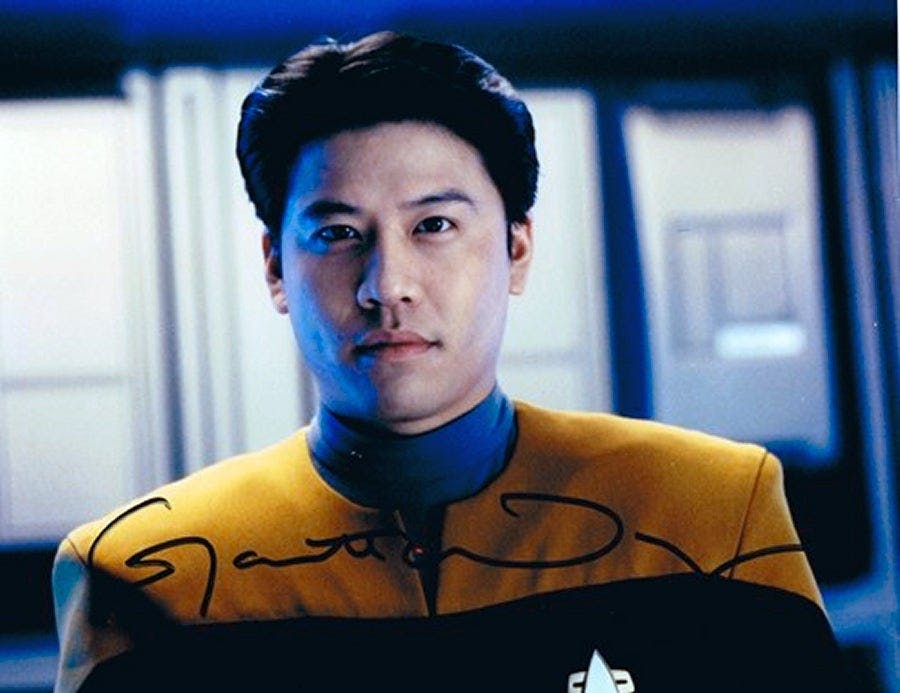
StarTrek.com
In 2018, Hollywood gave American moviegoers something most had never seen before — an East Asian love interest in a romantic comedy from a major studio. Crazy Rich Asians was a revelation in more ways than one, but Henry Golding's portrayal of Nick Young was certainly one of the reason's for its success. (Star Trek: Discovery'sMichelle Yeoh in the role of his mother, Eleanor Sung-Young, was a huge part of the film as well). It may not have been the first on-screen East Asian romantic lead in a major American film, but roles like that are certainly scarce.
The scarcity stems from stereotyping which began in the 1800s; Chinese immigrant men, wearing the traditional dress of the Qing dynasty, sported long braids (queues) and sometimes robes which were seen as reminiscent of Western dresses. Not only that, but they were barred from many industries and only allowed jobs considered “women’s work,” like laundry and cooking. On the flip side, East Asian men were often portrayed as predators of white women in early 20th Century pulp fiction media as part of the Yellow Peril sub-genre. The media of the time exploited cultural fears and anxieties around the perceived “other,” especially as Japan became more of a military and security threat in the run-up to and during World War II.
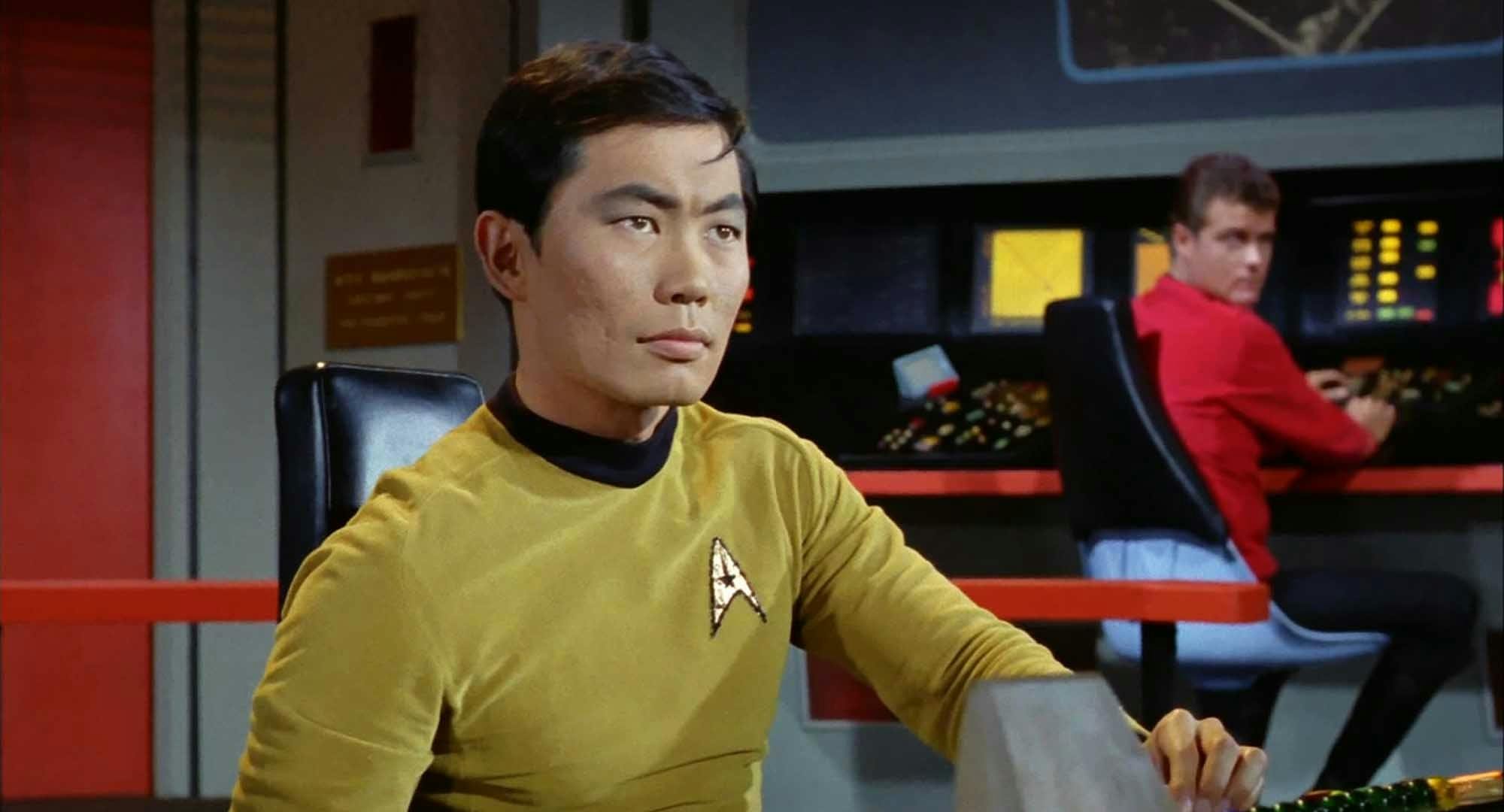
StarTrek.com
Star Trek: The Original Series shoved the American media world in the right direction by giving us George Takei as Lieutenant Hikaru Sulu - an admirable member of the bridge crew and one of the series’ heroes. He was a rare character of Asian descent who got to be a major player on a sci-fi show. In fact, such sci-fi roles for Asian characters are so rare that decades later, when John Cho took over the role for the 2009 Star Trek cinematic reboot, Sulu’s very existence still felt groundbreaking for diversity in media.
But more than a decade before that, Star Trek: Voyager gave us Garrett Wang as Ensign Harry Kim — who was not only a major character on a sci-fi show, but also the romantic lead in several episodes. While his adventures (well, mostly misadventures) in love were entertaining and often lighthearted fun, they were also something of a milestone for Asian American representation. In a media landscape in which Asian men were almost never depicted as desirable, Harry Kim got the girl and, in 1997, Garrett Wang was even named one of People Magazine’s 50 Most Beautiful People in the World.
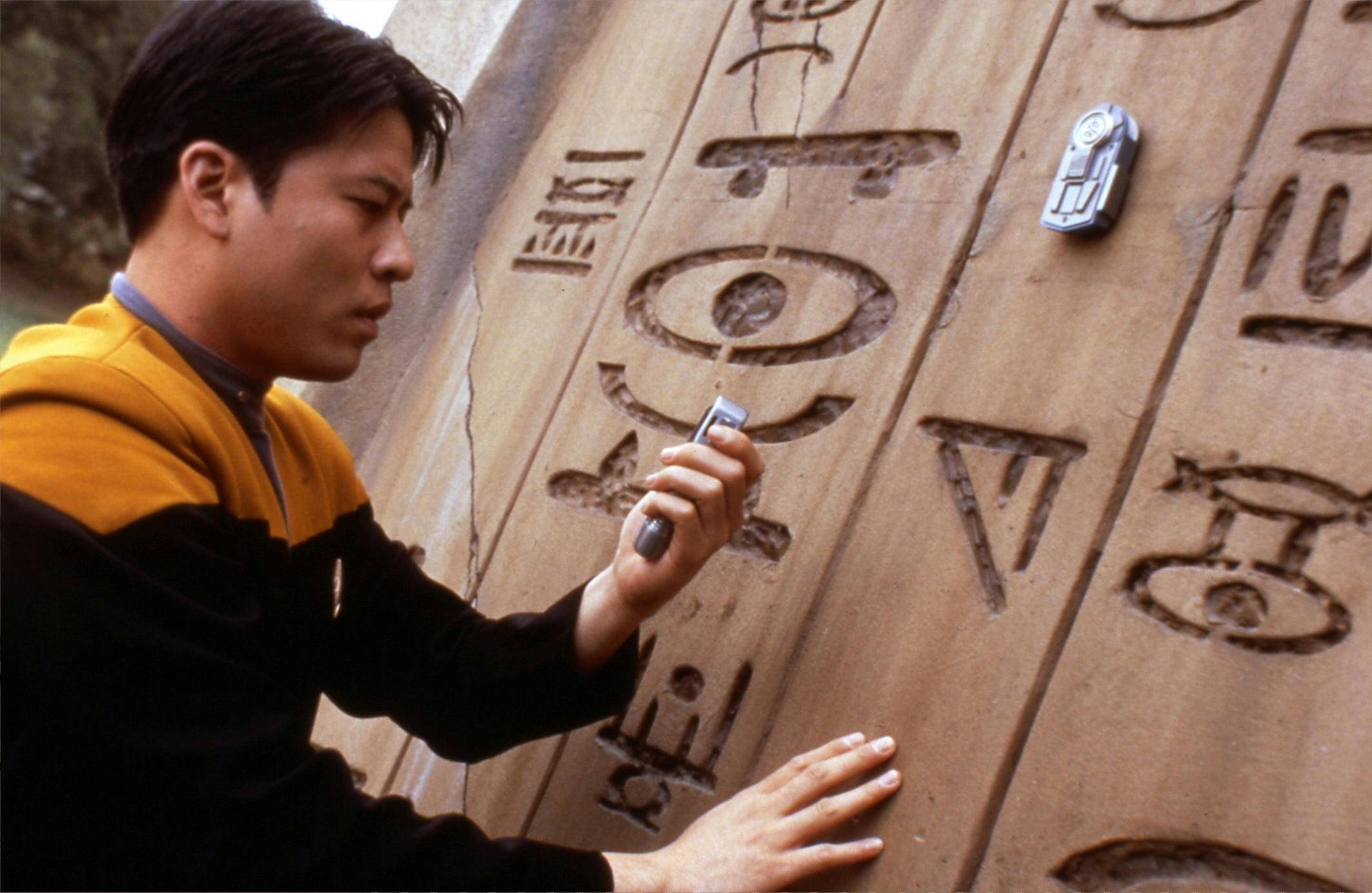
StarTrek.com
Media stereotypes have real-world consequences. In 2014, a dating app study on race and attraction revealed that Asian men were considered the least desirable by women of all races. And there are oodles of anecdotes out there from Asian guys who’ve been told some variation of “I don’t date Asians.” While causation would be impossible to prove, it’s not a leap to say that over a century’s worth of film and television stereotyping and erasure has influenced the way Americans see Asian men. Which is why Harry Kim’s role as Voyager’s go-to for romantic subplots and mishaps is so significant. Even when he didn’t get the girl, his romantic pursuits were treated as simply a fact of life — no different from those of any other young man. That may not sound like a big deal, but in a barren world, mere existence is an act of triumph.
Perhaps if there were more characters like Harry Kim on-screen, perceptions would begin to change. To its credit, much of the media world is currently pushing for more diversity and inclusion. The lack of significant Asian characters in cinema, despite the efforts of talented (and under-utilized) actors like Star Trek's Cho, was so pronounced that in 2016, an impromptu Twitter campaign, #StarringJohnCho, popped up. Using the hashtag, people posted photoshopped images of what well-known movies would have looked like if John Cho, instead of a white male lead. This had the effect of both protesting the lack of Asian male leads in Hollywood and illustrating what audiences were missing. A sister campaign, #StarringConstanceWu, went around shortly after to highlight the lack of Asian female leads. Two years later, movies actually starring John Cho and Constance Wu were released — Searching, which received rave reviews and garnered a Best Male Lead award for Cho at the Independent Spirit Awards, and the aforementioned Crazy Rich Asians, a box office smash that earned Wu a Golden Globe nomination for Best Actress in a Motion Picture Comedy or Musical.
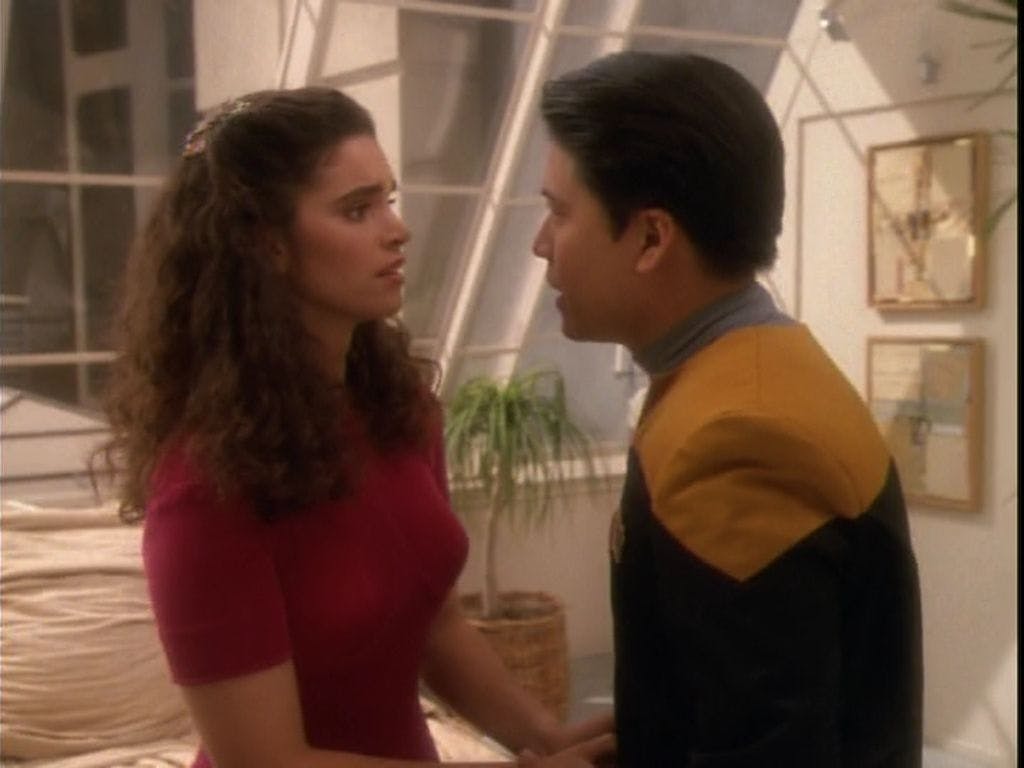
StarTrek.com
Voyager was the most re-watched Star Trek series on Netflix in 2017 (the last time this particular stat was released), meaning that decades after his show ended, Harry Kim is still exerting a positive influence on the way Asian men are seen on-screen. Things are changing, albeit more slowly than I would l like them to be. However, I know I can always count on the greater Star Trek franchise to continue pushing diverse romantic leads of all kinds to the forefront, helping to create lasting, meaningful change on the big and small screens.
This article was originally published on May 2, 2021.
Mary Fan is a sci-fi/fantasy writer hailing from Jersey City, NJ. She is the author of the Jane Colt sci-fi series, which comprises Artificial Absolutes (2013), Synthetic Illusions (2014), and Virtual Shadows (2015). She authored Starswept(2017), and Flynn Nightsider and the Edge of Evil (2018), a YA dark fantasy and the first novel of the Flynn Nightsider series. Due out in 2019 is Stronger Than a Bronze Dragon, a YA steampunk fantasy. Check out her official page at www.maryfan.com/.
Stay tuned to StarTrek.com for more details! And be sure to follow @StarTrek on Facebook, Twitter, and Instagram.
